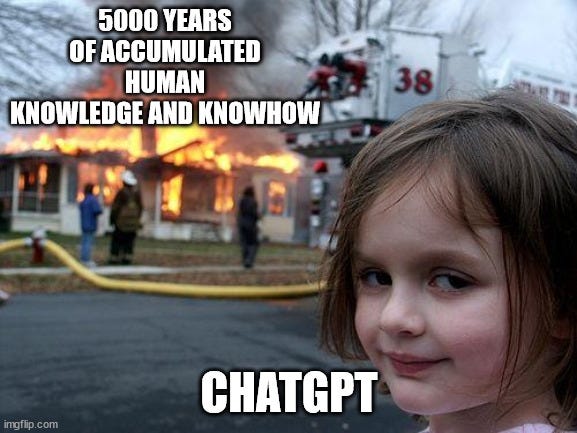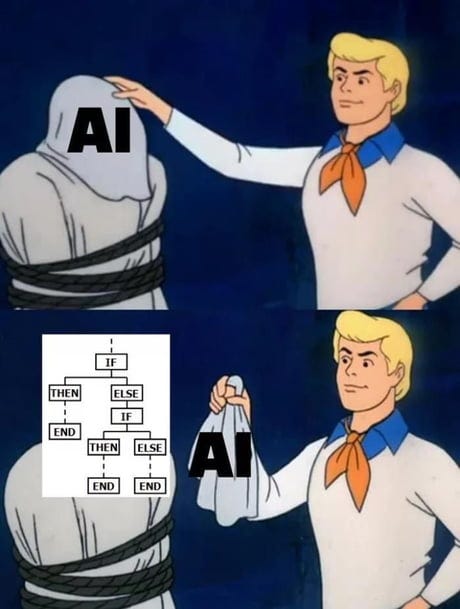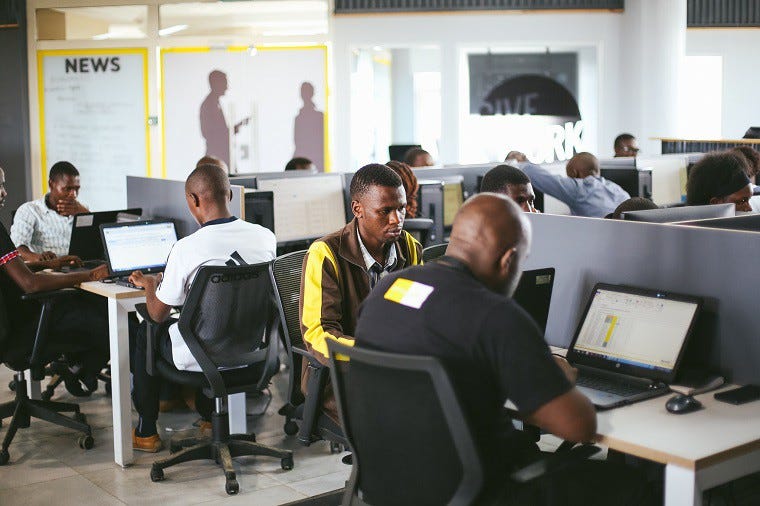We Should Stop Raving About AI — Here's Why
A brief look at the untold side of Artificial Intelligence (AI).

I am sceptical of the hype surrounding artificial intelligence, which some claim will make computers smarter than humans. More significantly, I believe we should stop pretending technology is created by “superior computer intelligence,” when in fact it has always relied on human operations. Previously, women performed those hidden tasks; now, exploited labourers in the poorest nations perform them.
Today, let’s go beneath the surface to look at something that is rarely discussed: exploitative labour practices and how innovation has been motivated by greed rather than a desire to make the world better.
This article will cover the following topics:
What is artificial intelligence?
Are computers becoming smarter than humans?
The Truth about AI
ENIAC's Hidden Figures
How AI relies on exploitative human labour.
How we allowed workers to be exploited so that we could enjoy technology.
If AI will leave us better off than we were before.
What will AI's future look like?
So, what is AI?
Artificial intelligence is the ability of a digital computer to perform tasks commonly associated with intelligent beings. The popularity of artificial intelligence has skyrocketed in recent months. Chat-GPT, an AI chatbot developed by OpenAI, rapidly became a trending subject on the internet after its November 2022 debut.

I am just as guilty as anyone else of having written about it. It's become such a common topic that now it has entered my friends’ WhatsApp group chats or family dinner conversations. I cannot spend a day without seeing a LinkedIn post about Chat- GPT.
Are computers becoming smarter than humans?
The common belief is that as computer programs become more intelligent, they won't require human input to learn.

Experts are coming up with the most dramatic predictions as a result of what some refer to as the "hysteria over AI”:
We won't require programmers in the future.
It will lead to a permanent underclass of unemployed individuals whose jobs have been automated.
We will have to use the nuclear threat to prevent AI research
We will face geopolitical wars based on AI.
We need to prepare ourselves for fierce power battles inside the huge complex that will link our brains to the AI embedded in the internet.” Laurent Alexandre, AI speaker
In fact, the fear of AI developing too quickly was raised in an open letter, ironically signed by Elon Musk, one of the co-founders of industry leader OpenAI. The group of AI experts called for a six-month pause, citing risks to society.
However, all the discussion about AI accomplishments fails to consider how computers are still reliant on humans for their initial programming. Or, as one journalist argues, “AI is neither artificial nor intelligent."
The true story behind AI

What the media often neglect when praising AI is the human aspect of the story. How intelligent robots are created, taught, and propelled by human minds and bodies is lost in the tale of AI. The real past of smart machines reveals that our AI is only as good as we are, despite the allure of super-intelligent machines that don't require human input.
ENIAC's Hidden Figures
In an astounding series, Spectrum explores the history of AI. One of the stupefying unknown stories is of the laborious and ground-breaking programming effort of a group of six women behind ENIAC's "man-made robot brain."

On February 14, 1946, journalists congregated at the University of Pennsylvania to watch a public demonstration of one of the world's first ancestors of AI: the Electronic Numerical Integrator and Computer (ENIAC).
Arthur Burks, an ENIAC team scientist, demonstrated the computer’s powers: the machine added 5,000 digits together in one second when the calculation would have taken humans days to do. The media were completely blown away.
What was hidden from the journalist was that the computer's evident intelligence was the result of hard work by those six women.
The engineers projected a sense of ominous technical supremacy by portraying ENIAC as an independent, intelligent computer while hiding the human labour involved.
AI relies on hidden human labour which is damaging and exploitative.
If we look at more recent AI history, in the case of OpenAI, what I reveal is that without cheap human labour in developing countries, chatbots would almost certainly be racist, misogynist, and homophobic.
The Internet feeds OpenAI—the same Internet that is full of trolls and controversial content. This is why GPT-3, ChatGPT's predecessor, was a difficult sell. The app was prone to making violent, sexist, and racist comments.
To fix the toxicity of ChatGPT and allow commercialization, Open AI came up with a safety system. The technology would detect and remove potentially harmful words from future AI model training datasets. According to a Time investigation, OpenAI began sending tens of thousands of text snippets to an outsourcing company in Kenya (Sama) in November 2021. Sama, based in San Francisco, employs workers in Kenya, Uganda, and India to label data for Silicon Valley clients like Google, Meta, and Microsoft.
The text that the data labellers had to read contained graphic details of child sexual abuse, bestiality, homicide, suicide, torture, self-harm, and incest.
The data labellers were paid between $1.32 and $2 per hour with precarious working conditions. And the stories they had to endure were gruesome.
Testifying anonymously, out of concern for his life, one Sama’s worker told TIME that he suffered from recurring visions after reading a graphic description of a man having sex with a dog in the presence of a young child. "That was torture," he said.
This is just one of the countless disturbing graphic tales that had to be read and tagged, leaving low-wage employees in great distress. Finally, in February 2022, eight months earlier than anticipated, Sama decided to cancel all its work for OpenAI because of the traumatic nature of the assignment.
This isn't the first time we've let workers be exploited so we can enjoy technology.
OpenAI project is similar to tales about Facebook moderators who were forced to watch rape, decapitation, and other atrocities for hours to assist the business in removing harmful content. Even after leaving their jobs, the majority of them experienced severe PTSD. One interviewee said she could no longer take pedestrian crossings after seeing too many videos of people being hit by cars. We are observing that, despite their foundational role in AI data enrichment, these professionals face precarious working conditions. In March, Facebook Content Moderators from Sama sued Meta over unlawful dismissal under Kenyan law. One moderator who took legal action believes part of his humanity is gone.
Those poor labour conditions could be the result of efforts to conceal AI's reliance on this large work population while celebrating technological efficiency gains. When something is out of sight, it is also out of mind.
Will AI leave us better off than we were before?

We always assume that technological advancement and innovation lead us to a better future. However, statistics show that the number of people living in extreme poverty has increased by 70 million since COVID, to more than 700 million. Global severe poverty increased to 9.3 per cent, up from 8.4 per cent in 2019. A few weeks ago, in France, President Macron forced a law to raise the pension age from 62 to 64. If we are getting more productive, why do we have to work more than our predecessors? Will AI advancements result in the suppression of manual jobs to replace them with more bullshit jobs? Instead of shortening the workday and improving labour conditions. Our current innovation model has failed us, so we should not assume it will act any differently with AI.
What will the future look like for AI?
The most important question is, "Who will benefit from AI?" AI innovation is not an altruistic, selfless act. Capital and the need to monetize drive innovation. This means that the emphasis will be on lucrative capitalistic goals rather than saving lives, particularly in poor countries. According to Bill Gates, "market forces will not naturally produce AI products and services that help the poorest,” and "the opposite is more likely."
According to an IMF study, artificial intelligence could widen the disparity between wealthy and impoverished countries by shifting more investment to industrialized economies where automation is already in place.
Let’s recall that before COVID, venture capitalists poured billions of dollars into 10-minute delivery startups rather than companies that help the billions who are suffering. "So much innovation is just one more app or game," says Magatte Wade, Davos World Economic Forum's Young Global Leader. “I want to see more venture capital and technology focused on resolving human issues."
Now we are seeing the same thing in AI, where billions of dollars have been given to startups that help you create your digital avatar (Stability AI raised $100m), generate automatic LinkedIn posts (Copy.ai raised $11m), automate enterprise processes (Adept raised $350m), and create chatbots (Character.AI raised $150m), rather than startups that focus on serving the poorest countries and saving lives.
Conclusion: the future of AI is unclear, but I hope it involves bettering the lives of the less privileged.
Many people discuss the positive outcomes of AI, and yet very few discuss the negative effects, which I believe cause society to lose sight of the big picture.
It's noteworthy that journalists held industries like fashion accountable for their environmental effects and use of child labour. It's so prevalent in the media that everyone is aware of the social implications of shopping at Zara or H&M. However, no one is discussing the negative consequences of technology, and we are all content to believe that computers will magically become intelligent on their own.
The reality is that no one knows what will happen with AI. Everything remains uncertain, let’s just hope that we will have more honest coverage of technology and push for innovation that benefits those who are most in need rather than adding to the growing inequality gap.







